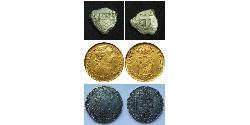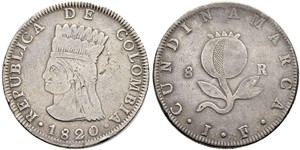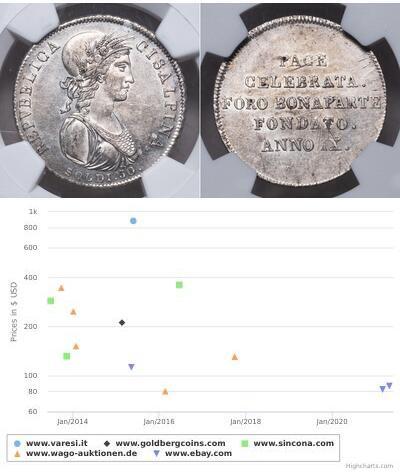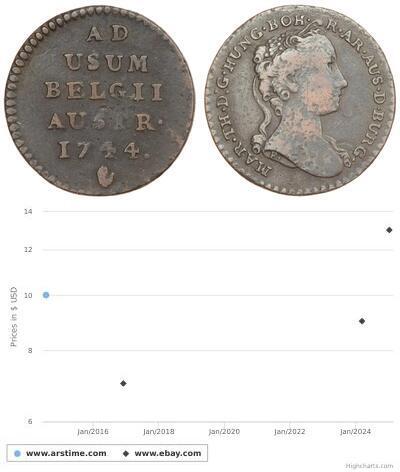8 Real
1770, Bolivia, Charles III. Large Silver 8 Reales Coin. Pillar Dollar! NGC XF+
Mint Year: 1770
Mint Place: Potosi (Bolivia)
Denomination: 8 Reales (Pillar Dollar)
Condition: Certified and graded by NGC as XF (Details: Cleaned!)
References: 1770-PTSI JR, KM-50 (variety with dot after "CAROLUS" in reverse!).
Weight: ca. 26.8gm
Diameter: 39mm
Material: Silver
Obverse: Crowned hemispheres, set on Gibralter, between crowned and banner-entwined pillars of Hercules.
Latin Legend: VTRAQUE VNUM . PTSI (with dot!) . I770 . PTSI (with dot!) .
Translation: "(he) united them (the old and the new world)"
Reverse: Shield of Arms of Castile and León, flanked by denominaiton (*R*) and value (*8*).
Legend: . CAROLVS . III . D . G . HISPAN . ETIND . R * / *R* / *8*
Expanded: CHARLES III DEI GRATIA HISPANIARUM ET INDIARUM REX
Translated: "Charles III by the Grace of God, King of the Spains and the Indies"
Pillar coins were a great improvement over cobs in that they were of a uniform size and weight without cracks or uneven edges. They had a deep full strike with all information clearly visible and were difficult to clip or counterfeit. Denominations for this new coinage included the one half, one, two, four and eight reales coins.
Charles III (January 20, 1716 – December 14, 1788) was King of Spain 1759–88 (as Carlos III), King of Naples and Sicily 1735–59 (as Carlo VII and Carlo V), and Duke of Parma 1732–35 (as Carlo I). He was a proponent of enlightened absolutism.
On August 10, 1759, his half-brother Ferdinand VI of Spain died, and Charles III left the Neapolitan/Sicilian dominions to go to Madrid. His second son would eventually rule in Spain as Charles IV. His third son would unify the Kingdom of Naples and Kingdom of Sicily to form the Kingdom of the Two Sicilies and ruled as Ferdinand.
As king of Spain, his foreign policy was marked by the alliance with France (the Family Compacts) and the conflict with Britain over the control of the American possessions. His support for France in the close of the Seven Years' War led to the loss of Florida to the British, although this was partly compensated by the acquisition of the French Louisiana. The rivalry with Britain also led him to support the American revolutionaries in their War of Independence despite his misgivings about the example it would set for the Spanish Colonies. During the war, Spain recovered Minorca and Florida, but failed to capture Gibraltar.
His internal government was, on the whole, beneficial to the country. He began by compelling the people of Madrid to give up emptying their slops out of the windows, and when they objected he said they were like children who cried when their faces were washed. In 1766, his attempt to force the madrileños to adopt the French dress for public security reasons was the excuse for a riot (Motín de Esquilache) during which he did not display much personal courage. For a long time after, he remained at Aranjuez, leaving the government in the hands of his minister Pedro Pablo Abarca de Bolea, Count of Aranda. Not all his reforms were of this formal kind.
Charles was a thorough despot of the benevolent order, and had been deeply offended by the real or suspected share of the Jesuits in the riot of 1766. He therefore consented to the expulsion of the order, and was then the main advocate for its suppression. His quarrel with the Jesuits, and the recollection of some disputes with the Pope he had had when King of Naples turned him towards a general policy of restriction of what he saw as the overgrown power of the Church. The number of reputedly idle clergy, and more particularly of the monastic orders, was reduced, and the Spanish Inquisition, though not abolished, was rendered torpid.In the meantime, much antiquated legislation which tended to restrict trade and industry was abolished; roads, canals and drainage works were established. Many of his paternal ventures led to little more than waste of money, or the creation of hotbeds of jobbery; yet on the whole the country prospered. The result was largely due to the king, who even when he was ill-advised did at least work steadily at his task of government. He created the Spanish Lottery and introduced Christmas cribs following Neapolitan models. During his reign, the movement to found "Economic Societies" (a rough prototype Chamber of Commerce) was born.
His example was not without effect on some of the nobles. In his domestic life King Charles was regular, and was a considerate master, though he had a somewhat caustic tongue and took a rather cynical view of humanity. He was passionately fond of hunting. During his later years he had some trouble with his eldest son and daughter-in-law. If Charles had lived to see the beginning of the French Revolution he would probably have been frightened into reaction. As he died on the 14th of December 1788 he left the reputation of a philanthropic and philosophic king, still nicknamed "el rey alcalde" ("the king mayor") because of the public works in Madrid. In spite of his hostility to the Jesuits, his dislike of friars in general, and his jealousy of the Spanish Inquisition, he was a very sincere Roman Catholic. Charles was responsible for granting the title "Royal University" to the University of Santo Tomas in Manila which is the oldest in Asia.

spa1 » Charles III of Spain - birth o ... (16 pièces)
Under Charles' reign (1759 – 1788), Spain began to be recognized as a nation rather than a collection of kingdoms and territories with a common sovereign. His efforts resulted in creation of a National Anthem, a flag, and a capital city worthy ...

|
Posté par:
anonymous 2023-10-30 |
|
||
|
||
|
||
|
||
|
||

-600-300-1wohwJflrMIAAAGLo7ZTnYJh.jpg)

-300-150-bToKbzbi2ocAAAFLgDgjlthz.jpg)
 Deutsch
Deutsch Русский
Русский Українська
Українська English
English Italiano
Italiano Français
Français Español
Español 汉语
汉语











